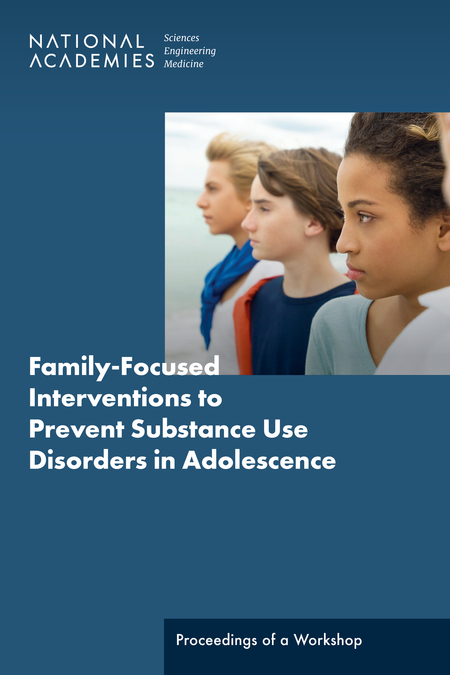News & Updates — FORE Announcements
New FORE-Funded Report from the National Academies: Benefits and Challenges of Integrating SUD Prevention in Primary Care
October 03, 2022 As part of our efforts to mark National Youth Substance Use Prevention Month, we are pleased to share a new report on how to encourage primary care providers to offer programs to prevent substance use disorders (SUDs) among adolescents. The report from the National Academies for Science, Engineering, and Medicine, Family-Focused Interventions to Prevent SUDs in Adolescence, is based on a two-day workshop supported by FORE. The workshop, held in May, was led by a national advisory group chaired by Leslie R. Walker-Harding, M.D., and attended by some 300 researchers; health care providers, members of parent and family organizations; federal, state, and local health officials; and Capitol Hill staff.
As part of our efforts to mark National Youth Substance Use Prevention Month, we are pleased to share a new report on how to encourage primary care providers to offer programs to prevent substance use disorders (SUDs) among adolescents. The report from the National Academies for Science, Engineering, and Medicine, Family-Focused Interventions to Prevent SUDs in Adolescence, is based on a two-day workshop supported by FORE. The workshop, held in May, was led by a national advisory group chaired by Leslie R. Walker-Harding, M.D., and attended by some 300 researchers; health care providers, members of parent and family organizations; federal, state, and local health officials; and Capitol Hill staff.
Three-quarters of people who develop SUDs begin using substances during adolescence, making this a crucial time to intervene. And according to the experts, to be most effective, prevention programs must target all family members, not just adolescents. Many SUD prevention programs are rolled out in schools, but they are often led by members of law enforcement. As the report notes, pediatricians and other primary care providers may be more trusted messengers and have many opportunities to screen teens for problems and offer support.
Experts noted that effective approaches not only target prevention, but aim to build resilience among family members. They should also take an upstream approach to understanding what families need to be strong, including sufficient food, safe housing, and other supports. While there are many challenges to implementing SUD prevention programs in primary care — not least engaging an overtaxed workforce — experts suggested that state Medicaid programs, new ways of paying for care, and federal support for training and other programs could help.
The grant to the National Academies for Science, Engineering, and Medicine is part of FORE’s program on Family and Community Based prevention, which includes a portfolio of nine grants, totaling $10.9 million over three years, focused on efforts to prevent SUD by supporting youth and families at high risk.